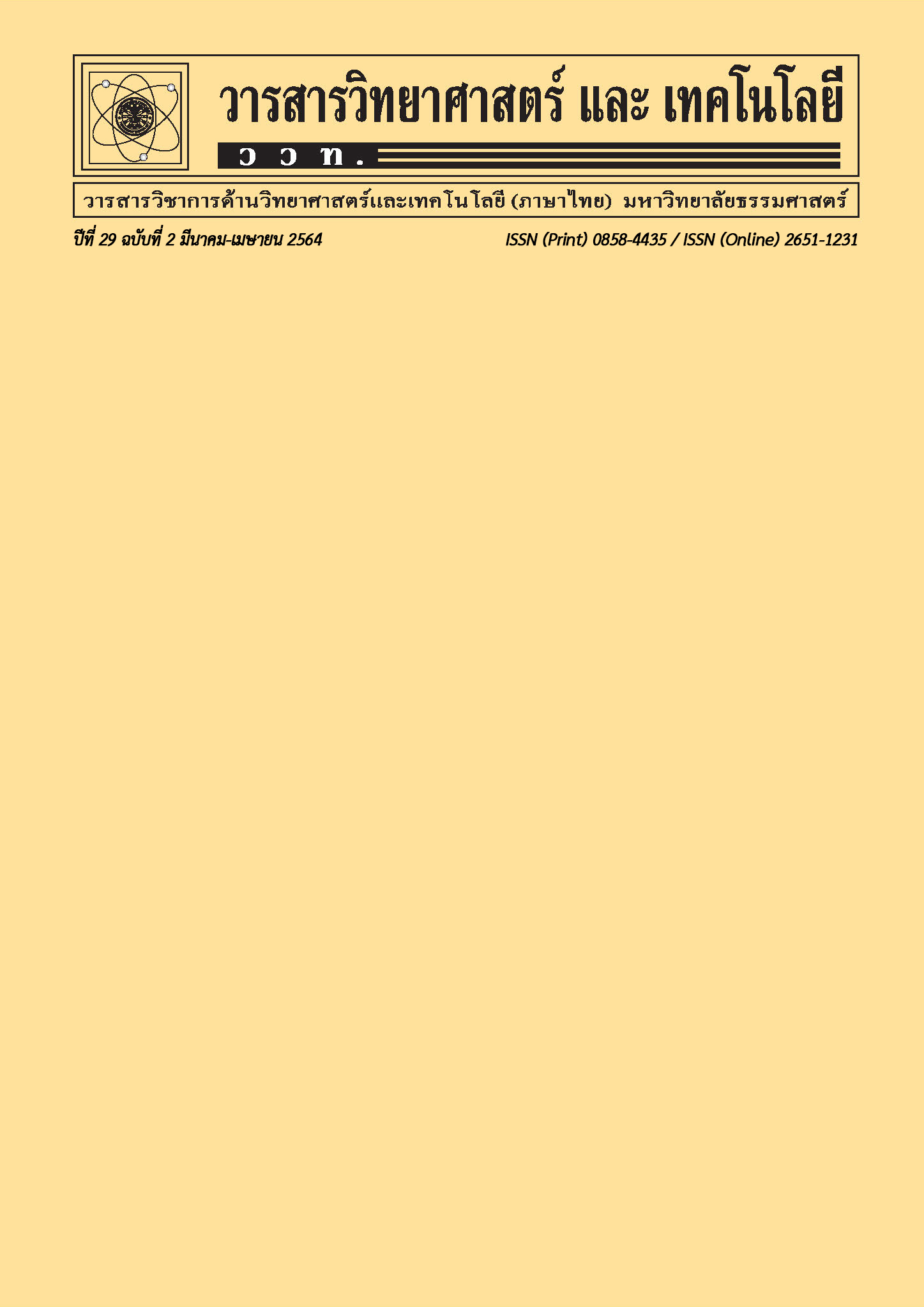ผลของนารินจินต่อการเกิดภาวะเครียดออกซิเดชั่นในตับหนูที่ได้รับน้ำตาลฟรุกโตส
Main Article Content
บทคัดย่อ
การบริโภคน้ำตาลฟรุกโตสในปริมาณที่มาก ทำให้เกิดภาวะเครียดออกซิเดชั่น นำไปสู่การทำลายของตับ และสามารถพัฒนาเป็นโรคไขมันพอกตับในที่สุด มีรายงานว่าสารนารินจินเป็นสารฟลาโวนอยด์พบในพืชตระกูลส้มมีฤทธิ์ต้านอนุมูลอิสระและลดไขมันในเลือด ดังนั้นงานวิจัยนี้มีวัตถุประสงค์เพื่อศึกษาผลของนารินจินต่อความเสียหายที่เกิดจากภาวะเครียดออกซิเดชั่น และการเปลี่ยนแปลงของโครงสร้างตับในหนูที่ได้รับน้ำตาลฟรุกโตส โดยหนูขาวเพศผู้จะได้รับน้ำดื่มผสมน้ำตาลฟรุคโตส 10 % เป็นเวลา 12 สัปดาห์ สารนารินจิน 100 มิลลิกรัม/กิโลกรัม จะถูกป้อน 4 สัปดาห์สุดท้ายของการได้รับน้ำตาลฟรุกโตส เมื่อสิ้นสุดการทดลอง ศึกษาการเปลี่ยนแปลงโครงสร้างของตับด้วยเทคนิคการย้อม haematoxylin และ eosin และการแสดงออกของหน่วยย่อยเอนไซม์ NADPH oxidase (NOX4 และ p47phox) และ 4-hydroxynonenal (4HNE) ในตับด้วยเทคนิค Western blot ผลการทดลองพบว่าการบริโภคน้ำตาลฟรุกโตสเพิ่มการแสดงออกของโปรตีน p47phox, NOX4, และ 4-HNE ในตับ เมื่อให้สารนารินจินจะมีผลลดการแสดงออกของโปรตีนข้างต้น นองจากนี้ยังพบว่ามีการขยายขนาดของเซลล์ตับและเกิดหยดไขมันแทรกขึ้นบริเวณไซโตพลาสซึม ซึ่งจะมีผลลดการเกิดพยาธิสภาพที่ตับ จึงสรุปว่าการป้อนสารนารินจินสามารถลดภาวะเครียดออกซิเดชั่นโดยการลดการแสดงออกของ NADPH oxidase subunit และลดการเกิดพยาธิสภาพในตับหนูที่ได้รับน้ำตาลฟรุกโตส โดยการศึกษานี้อาจเป็นไปได้ว่านารินจินมีฤทธิ์ช่วยลดการบาดเจ็บของตับที่เกิดจากน้ำตาลฟรุกโตส
Article Details
เอกสารอ้างอิง
Jeong, O. andKim, H.S., 2019, Dietary chokeberry and dried jujube fruit attenuates high-fat and high-fructose diet-induced dyslipidemia and insulin resistance via activation of the IRS-1/PI3K/Akt pathway in C57BL/6 J mice, Nutr. Metab. (Lond) 16: 38.
Mohamed, M.A., Ahmed, M.A., Elbast, S.A.A. and Ali, N.A., 2019, Rice bran oil ameliorates hepatic insulin resistance by improving insulin signaling in fructose fed-rats, J. Diabetes Metab. Disord. 18: 89-97.
Softic, S., Cohen, D.E. and Kahn, C.R., 2016, Role of dietary fructose and hepatic de novo lipogenesis in fatty liver disease, Dig. Dis. Sci. 61: 1282-1293.
Song, M., Vos, M.B. and McClain, C.J., 2018, Copper-fructose interactions: A novel mechanism in the pathogenesis of NAFLD, Nutrients 10(11): 1815.
Sreeja, S., Geetha, R., Priyadarshini, E., Bhavani, K. and Anuradha, C.V., 2014, Substitution of soy protein for casein prevents oxidative modification and inflammatory response induced in rats fed high fructose diet, ISRN Inflamm. 2014: 641096.
Jiang, J.X. and Torok, N.J., 2014, NADPH oxidases in chronic liver diseases, Adv. Hepatol. 2014: 742931.
Feillet-Coudray, C., Fouret, G., Vigor, C., Bonafos, B., Jover, B., Blachnio-Zabielska, A., Rieusset, J., Casas, F., Gaillet, S., Landrier, J.F., Durand, T. and Coudray, C., 2019, Long-term measures of dyslipidemia, inflammation, and oxidative stress in rats fed a high-fat/high-fructose diet, Lipids 54: 81-97.
Wang, J., Wu, Q. and Qiu, J., 2019, Accumulation of fructose 1,6-bisphosphate protects clear cell renal cell carcinoma from oxidative stress, Lab. Invest. 99: 898-908.
Malakul, W., Pengnet, S., Kumchoom, C. and Tunsophon, S., 2018, Naringin ameliorates endothelial dysfunction in fructose-fed rats, Exp. Therap. Med. 2018: 3140-3146.
Zhao, X.J., Chen, L., Zhao, Y., Pan, Y., Yang, Y.Z., Sun, Y., Jiao, R.Q. and Kong, L.D., 2019, Polygonum cuspidatum extract attenuates fructose-induced liver lipid accumulation through inhibiting Keap1 and activating Nrf2 antioxidant pathway, Phytomedicine 63: 152986.
Jain, M. and Parmar, H.S., 2010, Evaluation of antioxidative and anti-inflammatory potential of hesperidin and naringin on the rat air pouch model of inflammation, Inflam. Res. 60: 483-491.
Rajadurai, M. and Prince, P.S., 2007, Preventive effect of naringin on isoproterenol-induced cardiotoxicity in Wistar rats: An in vivo and in vitro study, Toxicology 232: 216-225.
Viswanatha, G.L., Shylaja, H. and Moolemath, Y., 2017, The beneficial role of Naringin-a citrus bioflavonoid, against oxidative stress-induced neurobehavioral disorders and cognitive dysfunction in rodents: A systematic review and meta-analysis, Biomed. Pharm. 94: 909-929.
Khodayar, M.J., Kalantari, H., Mahdavinia, M., Khorsandi, L., Alboghobeish, S., Samimi, A., Alizadeh, S. and Zeidooni, L., 2018, Protective effect of naringin against BPA-induced cardiotoxicity through prevention of oxidative stress in male Wistar rats, Drug Chem. Toxicol. 43: 85-95.
Zhao, L., Guo, X. and Wang, O., 2016, Fructose and glucose combined with free fatty acids induce metabolic disorders in HepG2 cell: A new model to study the impacts of high-fructose/sucrose and high-fat diets in vitro, Mol. Nutr. Food Res. 60: 909-921.
Almenara, C.C.P., Mill, J.G., Vassallo, D.V., Baldo, M.P. and Padilha, A.S., 2015, In vitro fructose exposure over activates NADPH oxidase and causes oxidative stress in the isolated rat aorta, Toxicol. In Vitro 29: 2030-2037.
Crescenzo, R., Bianco, F., Falcone, I., Coppola, P., Liverini, G. and Iossa, S., 2013, Increased hepatic de novo lipogenesis and mitochondrial efficiency in a model of obesity induced by diets rich in fructose, Eur. J. Nutr. 52: 537-545.
Crescenzo, R., Cigliano, L., Mazzoli, A., Cancelliere, R., Carotenuto, R., Tussellino, M., Liverini, G. and Iossa, S., 2018, Early effects of a low fat, fructose-rich diet on liver metabolism, insulin signaling, and oxidative stress in young and adult rats, Front. Physiol. 9: 411.
Crescenzo, R., Mazzoli, A., Luccia, B.D., Bianco, F., Cancelliere, R., Cigliano, L., Liverini, G., Baccigalupi, L. and Iossa, S., 2017, Dietary fructose causes defective insulin signaling and ceramide accumulation in the liver that can be reversed by gut microbiota modulation, › Food Nutr. Res. 61: 1331657.
Jin, R. and Vos, M.B., 2015, Fructose and liver function – is this behind nonalcoholic liver disease?, Curr. Opin. Clin. Nutr. Metab. Care 18: 490-495.
Ahmed, O.M. and Fahim, H.I., 2019, The preventive effects and the mechanisms of action of navel orange peel hydroethanolic extract, naringin, and naringenin in N-acetyl-p-aminophenol-induced liver injury in Wistar rats, 2019: 2745352.
de Abreu, I.C.M.E., da Costa Guerra, J.F., Pereira, R.R., Silva, M., de Lima, W.G., Silva, M.E. and Pedrosa, M.L., 2014, Hyper cholesterolemic diet induces hepatic steatosis and alterations in mRNA expression of NADPH oxidase in rat livers, Arq. Bras. Endocrinol. Metabol. 58: 251-259.
Nauseef, W.M., 2014, Detection of superoxide anion and hydrogen peroxide production by cellular NADPH oxidases, Biochem. Biophys. Acta 1840: 757-767.
Görg, B., Karababa, A. and Schütz, E., 2019, O-GlcNAcylation-dependent upregulation of HO1 triggers ammonia-induced oxidative stress and senescence in hepatic encephalopathy, J. Hepatol. 71(5): 36326406.
van der Werf, R., Walter, C., Bietiger, W., Seyfritz, E., Mura, C., Peronet, C., Legrandois, J., Werner, D., Ennahar, S., Digel, F., Maillard-Pedracini, E., Pinget, M., Jeandidier, N., Marchioni, E., Sigrist, S. and Dal, S., 2018, Beneficial effects of cherry consumption as a dietary intervention for metabolic, hepatic and vascular complications in type 2 diabetic rats, Cardiovasc. Diabetol. 17: 104.
El-Bassossy, H.M., Elberry, A.A., Azhar, A.S. and Ghareib, S.A., 2015, Ameliorative effect of allopurinol on vascular complications of insulin resistance, J. Diabetes Res. 2015: 178540.
Zhai, X., Ren, D., Luo, Y. and Hu, Y., 2017, Chemical characteristics of an Ilex Kuding tea polysaccharide and its protective effects against high fructose-induced liver injury and vascular endothelial dysfunction in mice, Food Funct. 8: 2536-2547.
Caglayan, C., Temel, Y., Kandemir, F.M., Yildirim, S. and Kucukler, S., 2018, Naringin protects against cyclophosphamide-induced hepatotoxicity and nephrotoxicity through modulation of oxidative stress, inflammation, apoptosis, autophagy, and DNA damage, Environ. Sci. Pollut. Res. Int. 25: 20968-20984.


